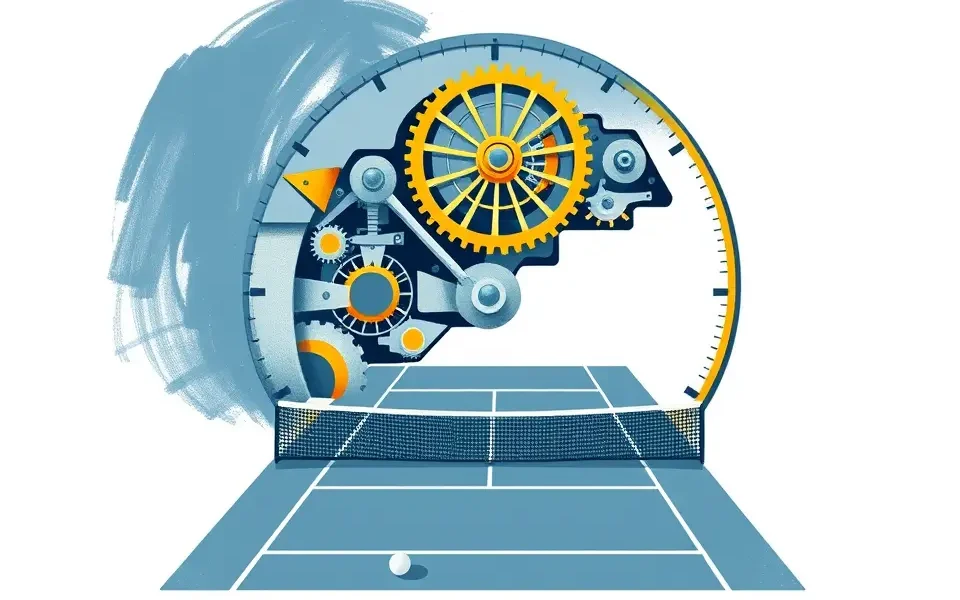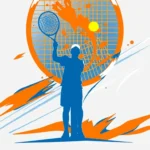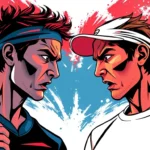Novak Djokovic, one of the greatest tennis players of all time, has often spoken about the influence of his rivals, Roger Federer and Rafael Nadal, on his own career. Beyond the fierce competition and pushing each other to greater heights, Djokovic has also highlighted specific lessons he’s learned from his peers. One key takeaway from Federer, in particular, revolves around a strategic approach to tournament scheduling, which Djokovic believes is a crucial, yet often overlooked, aspect of success in professional tennis. Moreover, Djokovic has pointed out a common mistake many players make, shedding light on the mental fortitude required to excel in the sport.
The Federer Calendar Blueprint
In an interview, Djokovic credited Federer with revolutionizing how tennis players manage their calendars. Federer was among the first to truly optimize his schedule to ensure peak performance at Grand Slam tournaments. This involved carefully selecting which tournaments to play, balancing match play with rest and recovery, and strategically planning training blocks to build towards major events.
Djokovic acknowledged that he and his team meticulously studied Federer’s approach, taking notes and adapting it to his own needs. This emphasis on strategic scheduling allowed Federer to consistently arrive at Grand Slams in top physical and mental condition, a significant factor in his remarkable success.
Decoding the Calendar Strategy
The key elements of this strategic calendar management include:
- Prioritizing Grand Slams: Recognizing that Grand Slam tournaments offer the most ranking points and prestige, Federer focused on peaking for these events.
- Balancing Play and Rest: Avoiding overplaying was crucial. Federer understood the importance of rest and recovery to prevent burnout and injuries.
- Strategic Training Blocks: Implementing focused training periods to improve specific aspects of his game and build overall fitness leading up to major tournaments.
- Surface Considerations: Factoring in the different court surfaces (clay, grass, hard court) and adjusting his schedule to allow for adequate preparation on each surface.
Djokovic’s Adaptation
Djokovic adopted a similar approach, tailoring it to his unique physical and playing style. He emphasized the importance of listening to his body, adjusting his schedule based on fatigue levels, and incorporating specialized training to address specific weaknesses or prepare for particular opponents.
The Mental Game: Avoiding a Common Pitfall
Beyond the physical and strategic aspects, Djokovic has also emphasized the mental side of tennis. He identified a common mistake many players make: dwelling on errors and allowing negativity to impact their performance.
Djokovic stresses the importance of a positive mindset and the ability to reset after each point, regardless of whether it was a winner or an unforced error. This involves:
- Focusing on the Present: Concentrating solely on the next point and avoiding dwelling on past mistakes.
- Maintaining a Positive Attitude: Cultivating a resilient mindset that allows players to bounce back from setbacks.
- Learning from Errors: Analyzing mistakes to identify areas for improvement, but without letting them affect confidence.
- Controlling Emotions: Managing frustration and anger to prevent them from negatively impacting decision-making and execution.
Resetting After Mistakes
Djokovic’s ability to quickly reset after errors is a hallmark of his mental toughness. He achieves this through various techniques, including:
- Deep Breathing: Taking a few deep breaths to calm nerves and regain focus.
- Positive Self-Talk: Reinforcing confidence with positive affirmations.
- Visualizing Success: Mentally rehearsing successful shots and strategies.
- Acceptance: Acknowledging that mistakes are inevitable and accepting them as part of the game.
The “Big Three” Dynamic
Djokovic has frequently acknowledged the profound impact of his rivalries with Federer and Nadal. He recognizes that competing against these two legends has pushed him to evolve as a player and elevate his mental game. The “Big Three” era has been a golden age for tennis, marked by intense competition and mutual respect.
Inspiration and Motivation
Djokovic credits Federer and Nadal with inspiring him to strive for greatness. Their dedication, professionalism, and relentless pursuit of excellence have served as a constant source of motivation. He believes that the rivalries among the three have not only improved their individual games but have also elevated the sport as a whole.
A Sporting Rivalry
Despite the fierce competition on the court, Djokovic emphasizes that his relationships with Federer and Nadal are built on mutual respect. He recognizes that their rivalries are purely sporting and that there is no personal animosity involved. He acknowledges their achievements and appreciates the opportunity to compete against two of the greatest players in history.
Lessons Beyond the Court
The lessons Djokovic has learned from Federer and the challenges he has overcome offer valuable insights applicable beyond the world of tennis. Strategic planning, mental resilience, and the ability to learn from both successes and failures are essential qualities for success in any field.
Strategic Planning
Federer’s approach to calendar management underscores the importance of strategic planning in achieving long-term goals. Whether in business, academics, or personal life, having a clear roadmap and prioritizing key objectives is crucial. This involves:
- Defining Goals: Setting clear and measurable objectives.
- Prioritizing Tasks: Identifying the most important tasks and focusing efforts accordingly.
- Allocating Resources: Distributing resources (time, money, energy) strategically.
- Monitoring Progress: Tracking progress and making adjustments as needed.
Mental Resilience
Djokovic’s emphasis on mental toughness highlights the importance of resilience in overcoming adversity. The ability to bounce back from setbacks, maintain a positive attitude, and persevere in the face of challenges is essential for success in any endeavor. This involves:
- Developing a Growth Mindset: Believing that abilities can be developed through dedication and hard work.
- Cultivating Optimism: Maintaining a positive outlook and focusing on solutions rather than problems.
- Practicing Self-Care: Taking care of physical and mental well-being to prevent burnout.
- Seeking Support: Building a strong support network of friends, family, and mentors.
Learning from Failure
Djokovic’s approach to mistakes underscores the importance of learning from failure. Rather than dwelling on errors, he analyzes them to identify areas for improvement. This involves:
- Analyzing Mistakes Objectively: Identifying the root causes of errors without assigning blame.
- Developing Actionable Solutions: Creating strategies to prevent similar mistakes in the future.
- Embracing Feedback: Seeking feedback from others to gain different perspectives.
- Viewing Failure as an Opportunity: Recognizing that mistakes are a valuable learning experience.
Mastering the Game: Djokovic’s Advice for Aspiring Players
Drawing from his experiences and the lessons learned from Federer and others, Djokovic offers the following advice for aspiring tennis players:
- Develop a Strong Foundation: Focus on mastering the fundamentals of the game, including technique, footwork, and strategy.
- Build a Solid Physical Base: Dedicate time to physical conditioning to improve strength, speed, endurance, and agility.
- Cultivate Mental Toughness: Develop a resilient mindset, practice positive self-talk, and learn to manage emotions effectively.
- Strategize Your Calendar: Plan your tournament schedule strategically to peak for major events and avoid overplaying.
- Learn from Your Peers: Study the games of top players, analyze their strengths and weaknesses, and adapt their strategies to your own game.
- Seek Expert Guidance: Work with experienced coaches, trainers, and mentors who can provide valuable insights and support.
- Embrace Hard Work: Be prepared to put in the necessary time and effort to achieve your goals.
- Stay Humble: Maintain a humble attitude, respect your opponents, and never stop learning.
- Enjoy the Process: Remember to have fun and enjoy the journey, regardless of the outcome.
- Never Give Up: Persevere through setbacks, stay focused on your goals, and never lose your passion for the game.
The Enduring Legacy of a Champion
Novak Djokovic’s career is a testament to the power of hard work, dedication, and strategic thinking. His ability to learn from his rivals, overcome challenges, and continuously evolve as a player has made him one of the most dominant forces in tennis history. His insights on strategic planning, mental resilience, and the importance of learning from failure offer valuable lessons for aspiring athletes and anyone seeking success in their chosen field. By embracing these principles, individuals can unlock their full potential and achieve their goals, both on and off the court.








No Comment! Be the first one.